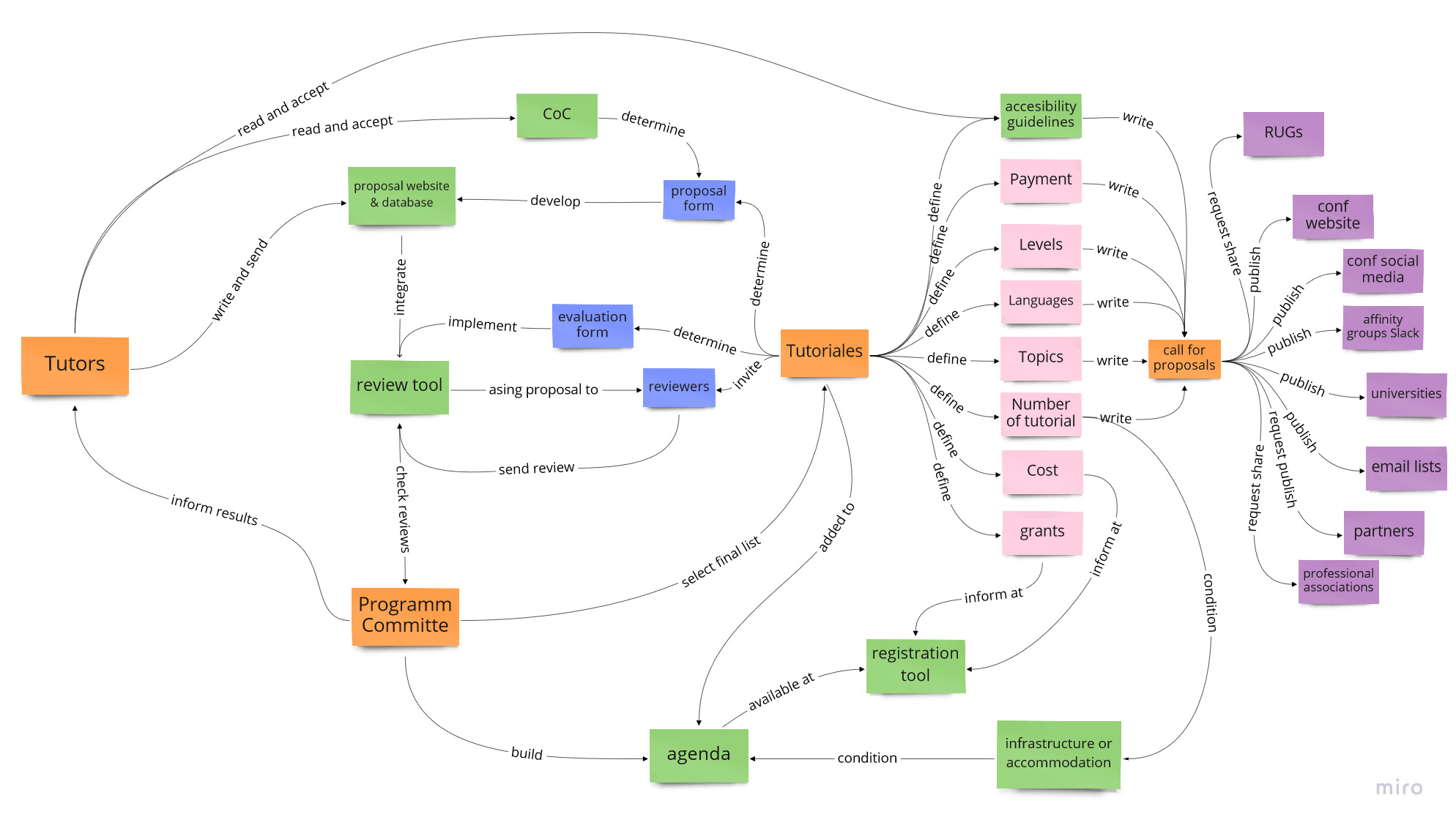Organizing Tutorials
By Yanina Bellini Saibene in Theme Features R
October 24, 2022
Tutorials, workshops, and training sessions can take many forms at conferences and events. As an organizer, you will have to plan and make decisions to provide a quality experience for attendees and teachers. There are many ways and tools to accomplish this goal.
In this first post, we will develop a mental model of what is involved in organizing the training session of an event.
A mental model for organize a training session
I have been responsible for organizing the tutorial section of several congresses and conferences, in on-site and on-line settings.
This concept map presents my mental model for organizing a tutorial session at a conference. Most of the steps are modality independent: it doesn’t matter if the conference is online, face-to-face or hybrid.

Concept Map for organizaing a workshop session in a conference.
We can start reading the map from any place, but I will choose to begin with “Tutorials” at the center of the map.
The section on the right of “Tutorials” show all the concept you need to define for your session, like levels, languages, costs, and the number of tutorials, among other things. All these details will be part of the call for proposals which will be published in different spaces and sent to several contacts like universities and professional associations, among others.
The section on the left of “Tutorials” presents the tools and process for tutors to agree and know with rules and guidelines of the conferences like the Code of Conduct and Accessibility guidelines, send their proposal for review, reviewers providing an opinion and program committee making the final decision and agenda. It also shows other details that will influence that final schedule like infrastucture and accomodation resources.
We will develop the concep map’s sections in detail in the following posts. now we will define the roles and responsibilities that we can find when organizing the training session of a congress and are present in our concept map.
Roles and responsabilities
Organizers
The organizers are responsible for determining the details of the tutorial session. They will also decide whether to hold an open call for proposals, an invitation, or a combination.
The organization is also responsible for convening the reviewers and program committee, who will review the proposals, select the final offer, communicate the results, and generate the agenda for the training session.
The organizers are also responsible for defining and writing the general rules for diversity, the code of conduct, and the accessibility guidelines of the conference. As the tutorials are part of the conference, they must adhere to these rules.
Tutors
Tutors are responsible for writing and submitting workshop proposals. In addition, they must read and accept the code of conduct and the diversity statement. They must also read and implement the conference accessibility guide for their workshop.
If selected, they will participate in the final assembly of the schedule and collaborate with the diffusion of the conference, particularly with their workshop.
Program Comittee
The program committee will write the call for tutorials or the invitation for tutors. They will also develop the proposal submission form and build a rubric to evaluate the proposals.
Some of the program committee members can make revisions and suggest reviewers for this stage.
Other tasks include collaborating with the selection of the platform to perform the review process and implement this process. With the final results of the reviews, they will make the final selection and set up the agenda for the training session.
This committee will assist in communications provinding information of key dates like opening and closing the call, evaluation, communication of results, and final tutorials offer.
Reviewers
The reviewers will read the proposals assigned to them, evaluate them using the suggested rubric, and communicate their opinion to the program committee.
They should be professionals who, in addition to being knowledgeable about the conference’s subject matter, know about teaching and learning.
Some general consideration
When we form the team for each of these roles, let’s keep in mind to create a diverse group with people from diverse backgrounds to benefit from their expertise, experience, and different perspectives and reality. Depending on the size of the conference, some of these roles may be performed by the same group of people.
Is a good idea that all these roles provide feedback about their participation in the entire process and the associated documents and platforms to improve it in future editions.
Next steps
In the next post, we will detail how to make the call for proposals for tutorials. Then, I will share the strategy of the three conferences (useR!, LatinR and JAIIO), how they did the calls or invitations to the tutors, what information they requested in the proposal forms, and what evaluation rubric was used. I will also make templates available for these communications.
As always, comments, questions and feedback on the post are very welcome.